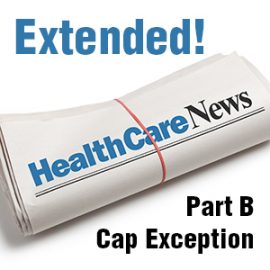Part B Cap Exception Extended. Transition to Value-Based Service Model Continues.
Some of our rehabilitation therapy revenue is paid by the Medicare Part B program under a fee schedule. Congress has established annual caps that limit the amounts that can be paid (including deductible and coinsurance amounts) for rehabilitation therapy services rendered to any Medicare beneficiary under Medicare Part B. The Deficit Reduction Act of 2005 (DRA) added Sec. 1833(g)(5) of the Social Security Act and directed the Centers for Medicare and Medicaid Services to develop a process that allows exceptions for Medicare beneficiaries to therapy caps when continued therapy is deemed medically necessary.
 Annual limitations on per beneficiary incurred expenses for outpatient therapy services under Medicare Part B are commonly referred to as “therapy caps.” All beneficiaries began a new cap year on January 1, 2015, since the therapy caps are determined on a calendar year basis. For physical therapy (PT) and speech-language pathology services (SLP) combined, the limit on incurred expenses is $1,940 in 2015. For occupational therapy (OT) services, the limit is $1,940 in 2015. Deductible and coinsurance amounts paid by the beneficiary for therapy services count toward the amount applied to the limit.
Annual limitations on per beneficiary incurred expenses for outpatient therapy services under Medicare Part B are commonly referred to as “therapy caps.” All beneficiaries began a new cap year on January 1, 2015, since the therapy caps are determined on a calendar year basis. For physical therapy (PT) and speech-language pathology services (SLP) combined, the limit on incurred expenses is $1,940 in 2015. For occupational therapy (OT) services, the limit is $1,940 in 2015. Deductible and coinsurance amounts paid by the beneficiary for therapy services count toward the amount applied to the limit.
An “exceptions process” to the therapy caps was expected to expire on March 31, 2015; however, the U.S. House of Representatives and Senate each voted to extend the Cap Exceptions process through December 31, 2017. For claims exceeding the $1940 therapy caps, therapy service providers and suppliers may request an exception when one is appropriate. When using the Cap Exceptions process to continue treatment beyond the $1940, the provider is attesting that the services are reasonable and necessary and that there is documentation of medical necessity in the beneficiary’s medical record. The passage of this bill repeals the sustainable growth rate (SGR) and moves toward payment systems based on quality, but does not end the Medicare outpatient therapy cap.
Instead of a full repeal, the therapy cap exceptions process will extend until December 31, 2017. The vote on the SGR ends payment system that would have resulted in 21% reductions in Medicare Part B Fee Screen. One of the most significant features of the bill is that it sets the stage for a transition to value-based health care services, and away from the fee-for-service model. The Centers for Medicare and Medicaid Services (CMS) has submitted the CARE (Continuity Assessment/Record Evaluation) Item Set as the Functional Outcome Measure for Proposed SNF, LTACH and IRF in the Final Rule. For the SNF, it has been built into the MDS for Data Collection. By partnering with Optima Health Care Solutions, the maker of our therapy software Rehab Optima, we are one step ahead of the curve. Optima HCS has built the CARE Tool into our documentation system and was also approved as a national repository for the data because the CARE Item Set is geared toward mobility and self-care, we have also incorporated NOMS (National Outcome Measurement System) as the functional outcome measurement tool for our SLP Services. Optima HCS has also made this tool available in our documentation system. We are beginning the transition to requiring these tools as a part of our Evaluation and Discharge Process. The tools are standardized through the therapist certification in their use. These standardized measures incorporated into the evaluation and discharge process of our patients, further support the efficacy of our services and helping to position us for the ongoing changes expected in healthcare. Ensign Therapy is staying ahead of the curve!

